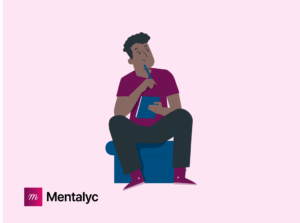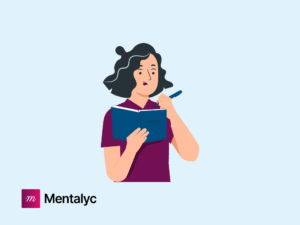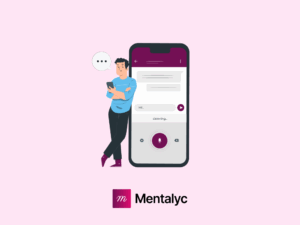Mentalyc Blog
-
Effective documentation is a cornerstone of quality patient care. Therapy progress notes serve as a vital tool for clinicians to communicate and collaborate with colleagues, ensuring continuity and providing a comprehensive understanding of a patient’s journey. While progress notes are essential for legal and reimbursement purposes, they also play a crucial role in tracking treatment outcomes and facilitating […]
-
Physical limitations can cause a variety of challenges with note-taking for mental health professionals. For many, note-taking is overwhelming and stressful enough, and when you add physical limitations, it makes it even more challenging to complete paperwork-related tasks. Vision-impaired individuals and those with carpal tunnel may deal with pain or eye strain, making documentation difficult. Many […]
-
Writing notes can be time-consuming and daunting if you’re a mental health professional. If you have Dyslexia, this process may be even more difficult and time consuming, as this condition can cause many frustrations. For many people, Dyslexia may cause difficulty with tasks related to writing and reading. Ensuring your notes are correct and high […]
-
If you are considering a career in play therapy and are passionate about working with children, this comprehensive article is tailored for you. You must maintain accurate documentation as a play therapist to ensure your practice’s success. Your job involves interacting with children and conducting critical evaluations. However, transforming these observations into concise, informative notes for your colleagues […]
-
As a therapist, your primary focus is to provide adequate care, maintain a strong therapeutic bond, and emotionally support your patients through their difficulties. Chances are, you are a people person. Not a paper person. But for every client you care for comes a duty to keep a chart with well-crafted clinical documentation. An essential aspect […]
-
Clinical assessment is rarely straightforward. Every client brings a unique mix of experiences, biology, and context that can make accurate diagnosis both challenging and deeply rewarding. That’s why combining the right tools, structure, and reflection is key to seeing the full picture. In this article, we’ll explore practical tools and therapist assessment strategies to improve diagnostic precision, reduce […]
-
Setting up a counseling business from home lets you build a practice that fits your life whether you’re offering telehealth sessions, seeing clients in person, or balancing both. With lower overhead and flexible hours, it’s an appealing path for many therapists starting or expanding their private practice. In this step-by-step guide, we’ll cover everything you […]
-
Mental health professionals have many standards they have to follow when completing documentation. Quality documentation benefits clinicians as it helps protect them in cases of insurance audits and demonstrates medical necessity, and helps ensure you’re meeting the standards required by insurance companies. Consistently writing quality progress notes and treatment plans is an essential tenet of any psychotherapist’s duties; however, […]
-
Psychiatric Notes The art of note-taking is a finely honed craft, cultivated through one’s professional journey. Among psychiatrists, documentation can pose a challenge in the sense that ascertaining what to prioritize can be daunting. While there are no quick fixes for mastering such a skill, invaluable insights and recommendations can significantly aid trainees. In this blog, […]
-
Family therapists are the superheroes of the therapeutic world. They therapeutically join with multiple people in a room, many of whom are at odds with each other, while facilitating complex interventions that allow family members to feel seen, heard, and equally challenged. All with the agility of Spiderman, swinging from rooftop to rooftop, or in […]
-
Evaluating Risks & Addressing Suicidality in Therapy Notes: An Expert’s Guide for Mental Health Practitioners Suicide, a tragic and heart-wrenching phenomenon, casts a dark shadow on families, friends, and communities, leaving behind a trail of total mayhem. The aftermath of such a tragedy underscores the pressing need for profound comprehension and proactive measures to thwart […]
-
Mental health professionals such as psychiatrists, psychologists, social workers, marriage and family therapists, and licensed professional counselors receive different training in their unique approaches to providing mental health care. However, they share a few things in common: the need for client charts with thorough clinical documentation and the mandate to keep client information and services […]
-
So… What Are Psychiatric Nursing Notes? Basically, psychiatric nursing notes stand as the quintessential instrument you’ll ever have as a proficient practitioner, enabling you to ascend to greatness in your field. No worries, we know you’re confused and we got you covered! Whether you’re a seasoned psychiatric nurse or just starting your career, this comprehensive guide is designed to […]
-
If you’re a mental health clinician, there will be times when you have to reach out to your clients between sessions. When you contact a client outside of the session, you want to document this in your client’s chart. Documenting all interactions with clients outside of the session is good practice. You may contact a […]
-
The mental status examination (MSE) is a crucial tool used by mental health professionals to assess a patient’s current psychological state. It’s a structured evaluation that goes beyond just symptoms and delves into the patient’s overall behavioral and cognitive functioning. The MSE also aids psychotherapists, social workers, and psychiatrists in finding an accurate diagnosis, monitoring […]
-
If you’re a therapist or mental health professional, you’re required by your state board to obtain ongoing continuing education. You must know the guidelines your state requires and what type of continuing education credits you need. Continuing education is not reciprocal and may be dependent on the state you live in. The mental health field […]
-
Mental health professionals must document goals in their treatment plans and progress notes. If you accept insurance or deal with third parties, writing clearly defined goals and objectives are essential parts of your documentation. Goal setting should be a collaborative process with your clients. It can be challenging to keep track of goals if you don’t have […]
-
Therapists don’t stop caring about their clients when services end. We continue to hold them in our hearts, root for them from afar, and want to provide the best possible transition out of treatment as a way for our care to have a long-lasting positive impact. The end of therapy is a critical stage in […]
-
If you’re considering starting a private practice in the mental health field, you may have many questions. You must take many steps to open your practice, market to your niche clients, and figure out strategies for maintaining and keeping track of everything. Knowing where to start can feel overwhelming. You have to choose what structure […]
-
As a social worker, it’s critical to have the ability to write detailed and factual social work case notes. Your notes serve as a written record of your client’s symptoms, progress, and treatment decisions and play a crucial role in guiding future interventions and ensuring continuity of care. Studies also show that well-written social work […]
-
Mental health documentation is an essential aspect of psychotherapy sessions. Documentation helps mental health professionals track progress from session to session, bill insurance, and helps justify why the client is there. Many mental health clinicians like to follow a specified format for progress notes. Following a format helps ensure you’re meeting insurance requirements and enables you […]
-
Mental health clinicians in Canada are responsible for handling sensitive information about their clients. It is essential to understand the legal and ethical implications of data protection in Canada to ensure that you are complying with the law and maintaining the trust of your clients. In this article, we will discuss everything about PIPEDA and […]
-
Clinicians today juggle countless responsibilities – client sessions, progress tracking, treatment planning, and, of course, the never-ending notes. Documentation can easily consume hours that could be spent focusing on clients. That’s why more and more clinicians are turning to HIPAA-compliant dictation software for psychotherapists – a secure solution that transforms spoken words into clear, organized […]
-
Self-care for therapists should be essential if you’re a full-time professional. I remember being in graduate school, working full-time, and completing an internship simultaneously. My professors drilled self-care into my head, but no one taught me how to do it, and more importantly, I thought, when will I find the time? Now after being a […]























